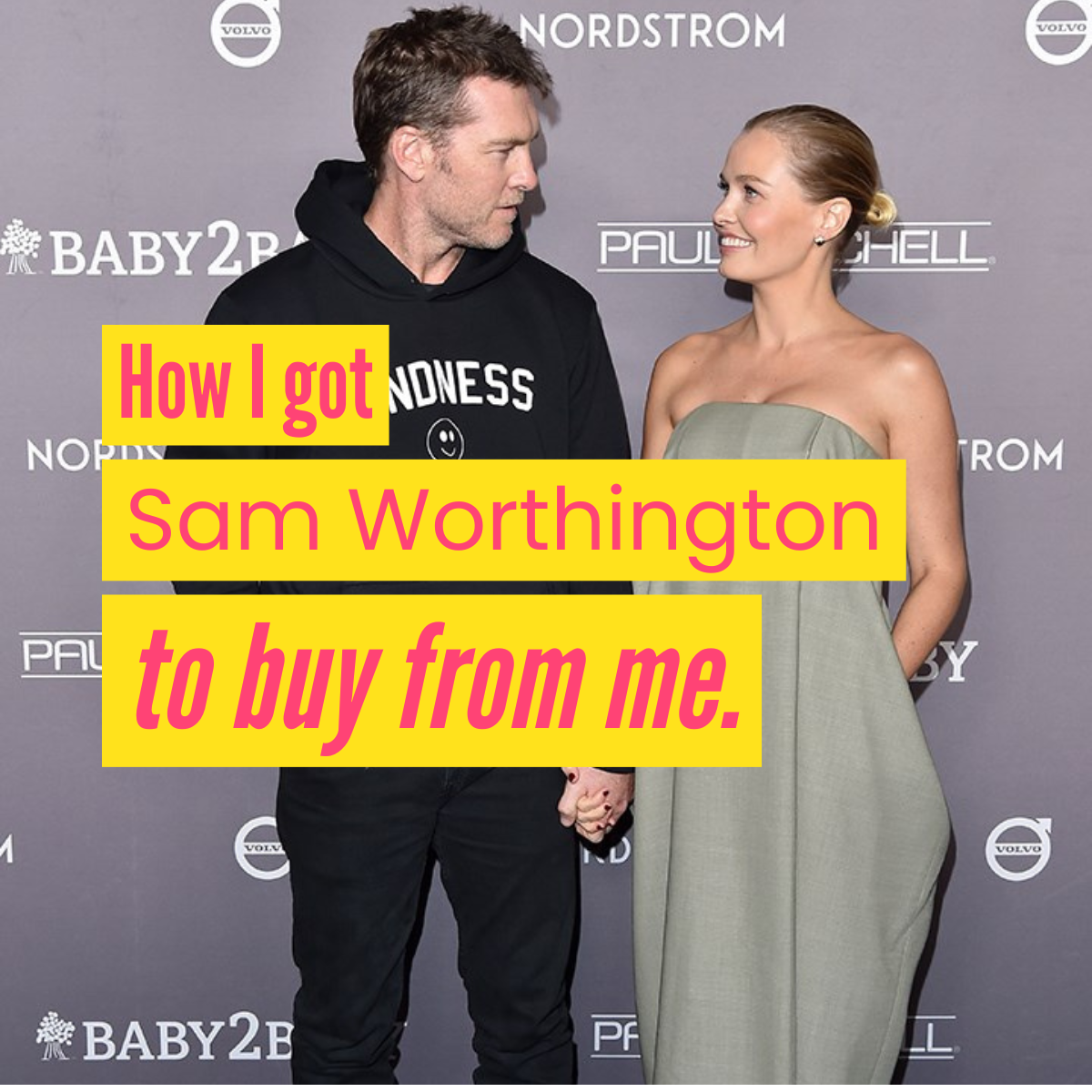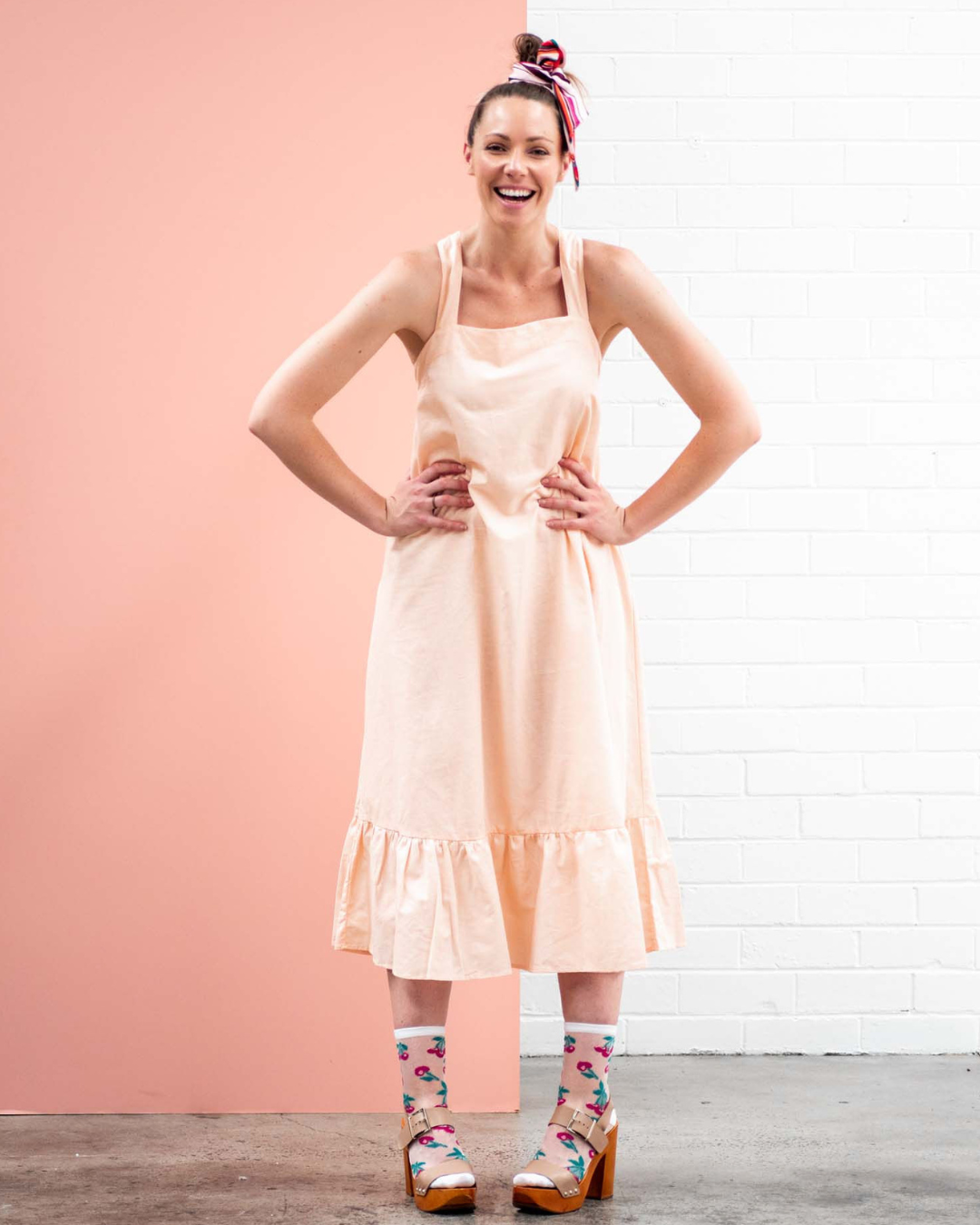After twenty-three years, Kerry and Angelo Pietrobon are more ‘together’ now than they’ve ever been. They’re married, but more so than the average couple; they spend seven days a week together, and five of them are in the studio working on their pride and joy, Harlow.
Harlow is a fashion label that ticks all the boxes. It is sustainable, Australian owned and made, size-inclusive, ethical and accessible. Kerry and Angelo have cultivated a strong brand over the past five years, and their customers return again and again for a piece of their pie. Harlow is the product of two minds and a shared vision, and watching Kerry and Angelo work together is as seamless as the ranges they release.
I visited their Brunswick studio recently and left feeling inspired, uplifted, and confident that the Australian fashion industry is in good hands, and what was meant to be a quick ten-minute interview, turned into an hour of great conversation and a few giggles...
Let’s go back to your first year of business. What lessons did you learn the hard way?
Launching a fashion label is not like the movie, A Field of Dreams. That old saying of 'build it, and they will come' – isn't true. When you're starting out, you think you know the gaps in the market, and you think you've got the solution, but you don’t. Retail psychology is half science and half art, and there's also a little bit of witchcraft to it. That’s the big mistake I see with young designers and new brands. It’s not as easy and transparent as you think it is. People say things like ‘test the market’, but even if you do that, there's plenty of things that go wrong with your first collection when you're actually in the market. You need to launch and get live feedback, and it's crucial that you start with the smallest collection you can. Starting out with a $30k collection is a terrible idea. Test the market with a small collection, and learn from that, because you can order more if you sell out, but you can't return stock to your supplier. The other problem we faced was finding where we fit into the market. When we started, we were ‘fast fashion’, not in a manufacturing sense, in an on-trend way, but we were made in Australia. We turned over seasonal ranges and they were still ethical, but because our shoppers wanted trends, they wanted to spend less. Working out that balance between being ethical, sustainable, affordable and on-trend, was hard. We learnt that the hard way.
The Harlow range is a complete wardrobe. How would you describe your approach to design and how do you make it work so well for the modern woman?
It’s contemporary, casual and wearable. The thing that we’ve learnt is that our customers want what's on trend, but at the same time, they don't want what everyone else is wearing. They want fashion they can wear every day, that still looks good, that will last, and that actually fits their bodies, but they also want something a little special. There’s a big gap there. We try and style things a few ways so that they can see the value in Harlow pieces, because they can be worn every day and styled for special occasions too. We try to encourage a 'less is more' approach because you don’t need a hundred pieces in your wardrobe. If you've got twenty Harlow pieces, you can style them so many different ways. If you’ve got something for work, we’ll show you how to wear it on the weekend and vice-versa. We believe that the clothes you have in your wardrobe should be the clothes you want to wear all the time, not just occasionally.
You release carefully curated looks every week, instead of seasonal ranges that drop twice a year. Why did you decide to buck the standard retail method and run with your own plan?
We drop one style per week, sometimes in a few colours. If it’s two styles that make an outfit, it’s twice a week. We want customers to feel excited about our brand, and people only have a certain amount of money to spend on fashion. If we dropped ten styles at the start of the season, no one would buy the full range straight away. They might miss out because they can only afford to buy one of those things, but when we slowly release it, they can afford something new more often. The way we operate our online store is like running a physical high street shop. People want a fresh window every week, so we’ve learned to translate that into online retail. The internet is so transient, so you have to work with that. We’ve built our online business to reflect a bricks-and-mortar store, so Facebook and Instagram are good brand-drivers, but our digital newsletter is our front window display. We have eight thousand subscribers, and it’s all about timing; it depends on what time of day you land in their inbox, where they are at that moment, and how much they have to spend that week. Just because we don't have a physical retail store, doesn't mean we can't look after our customers in the same way we would face to face. We work hard to deliver a great online experience for our customers, speaking to them across social media and newsletters as often as we can.
There's no doubting you've achieved an incredible online presence, but do you still face hesitation from people who don't like shopping online?
We try and make it as easy as possible. When people they tell me that they don't shop online, I tell them that they're missing out! People who are afraid of online shopping aren't just missing out on Harlow, they're missing out on all the incredible independent Australian artists, shoe-makers, jewellers and homeware stores that are scattered across the country. Many of these brands aren't ready for a retail shop or they can't afford it, but they are still amazing brands. I could spend four hours in a shopping centre trying to find the perfect pair of shoes that I like, but I could probably do that in less than an hour online. Shopping online is about valuing your own time and making the most of it. I've got plenty more important things to do than walk around a shopping centre looking for something I know I won't find, and that's another reason we launched Harlow. It's quality, wearable fashion for women sizes 12-26, and I know from personal experience that that's near impossible to find when you're out shopping.
If your focus in digital, why do you do pop-up stores?
The pop-ups are great, and having a physical presence is very important to reach new customers, but we couldn't justify a permanent store because the overheads of running a shop for our market would cripple us. People think that because we’re an established brand now that we can afford a shop, but the retail game in Australia is dangerous. Signing a five-year lease is daunting, and retail is very scary for small Australian businesses. At the moment we do small pop-ups because they’re manageable for us to staff, and we're still growing. There’s a lot of labour hours, it’s tiring, and logistically they’re complicated, but they’re worth it. We do four a year with the Australian Fashion Council in Melbourne, Sydney and Adelaide. Working with the Australian Fashion Council is great because without their help, we’d spend weeks looking for the right pop-up space, and the costs are ridiculous.
You don’t run sales and you don't mark down stock at the end of the season. Why?
It’s mostly for our customers and a little bit for the business. We just didn’t want to follow the standard retail calendar with sales; they’re already doing mid-season sales, pre-season sales, sales within sales, but what is it all for? Is it summer or is it winter? Which season is on sale? We could never understand it ourselves, so we decided not to follow it with Harlow. We understand our customers' buying rhythm, so that’s what we work to. Customers buy what they need when they need it, and they don't buy Harlow because it's on sale, they buy it because it makes them feel good, they love it, and it lasts. Our customers want quality and they want a satisfying shopping experience. Sales don’t give customers a good shopping experience, because if they buy a full price dress one week and then we go on sale the next, they feel ripped off, and we don't want to rip off our loyal customers. It doesn’t help the business, and it doesn't help our customers, so we’re tight with inventory and just don't go on sale. Sometimes we’re too tight because people miss out on certain styles, but we’d rather do that than flood the market. People want to wear what other people aren’t wearing, that’s what fashion is. We're moving away from 'apparel' to real fashion. Our customers want something special, so that's what we give them.
Starting and sustaining an Australian made slow fashion label in an industry that favours unethical alternatives, is a feat. It may have taken a few years for Kerry and Angelo to nut it out, but they've done it, and Harlow is now one of Australia's most loved size-inclusive labels.
To learn more about Harlow or to shop the range, head to harlowstore.com.
The Fashion Advocate x






